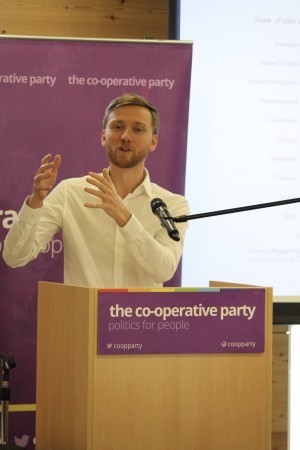Changing technology has brought sweeping changes to the world of work, sparking alarm in some quarters – but there is also room for optimism, the Co-operative Economy conference heard.
The Co-op Party event, held in London on 28 January, included a contribution from to Torsten Bell, director of the Resolution Foundation, a think tank which is researching living standards. It examined the effects of automation in its study Robot Wars.
He said it was a hopeful sign that the UK’s employment rate is at a record high (74.5%) – and that, depending on perspective, jobs at risk of automation make up 9% of the total jobs across the UK, rather than 50%.
Mr Bell, a former director of policy for the Labour Party and special adviser and civil servant in the Treasury, warned that some sectors – such as manufacture of clothing, medical and optical equipment and leather goods – were more at risk than others.
Related: Tom Watson on how co-ops should deal with the automation of work
The internet and artificial intelligence will also continue to change service jobs, he warned – but the problem might actually be that there are not enough robots.

“As a result, people are not being paid enough due to a lack of productivity,” he said.
Other problems – such as the “worrying rise in precarious work”, with an increasing number of workers paid less than the living wage, on zero-hours contracts or self-employed – were features of the labour market, he argued.
These were not being dealt with, but technology was not the real issue, he told the conference.
In its study, the Resolution Foundation urged the government to step in to tackle the challenges of the modern workplace. There was a need for more investment, research, education and responsive regulation, and policymakers should continue to aim for high pay and full employment.
Are our jobs just changing?
Kirsty Major, journalist at the Independent, told the conference that jobs were not disappearing, but changing.
She gave the example of Uber, which is researching a system to replace drivers with self-driving cars. “There will be new jobs like analysing the data managing those cars but the people driving the cars won’t be trained for this,” she said.
Ms Major thinks the role of unions will move away from collective bargaining to training of members. Unions will be able to bargain with employers to secure training for members facing job changes, she argued.
The government could follow the example of Singapore, which is working with companies to give people access to training. Ms Major gave the example of the Singapore Professionals’ and Executives’ Co-operative (SPEC), set up by the Singapore Human Resources Institute in 2000 after the financial crisis of 1998 claimed the jobs of professionals, managers, executives and technicians (PMETs).
Related: The co-op helping Singapore’s seniors back into work
SPEC is helping PMETs to change their mindset – for instance, by changing their lifelong expectation of working for only one employer to working for a range of organisations that require their services and expertise.
“We shouldn’t be afraid of automation but of inequality. It can be good if you want it to be,” added Ms Major.
Constance Laisne, a founder of Altgen, a co-op advising young people how to set up co-operatives, talked about her organisation’s experience. Over the past few months Altgen has been advising freelancers on how to set up worker co-ops.
“A whole generation of young people comes to world of work with anxieties,” she said – but argued the real problem is not automation but a lack of “meaningful jobs”.
“If it was me, I would be happy about robots taking jobs,” she said. “I want a meaningful job that restores the planet and cares for people, one I’m in control of, I own.
“I don’t see that many around.”